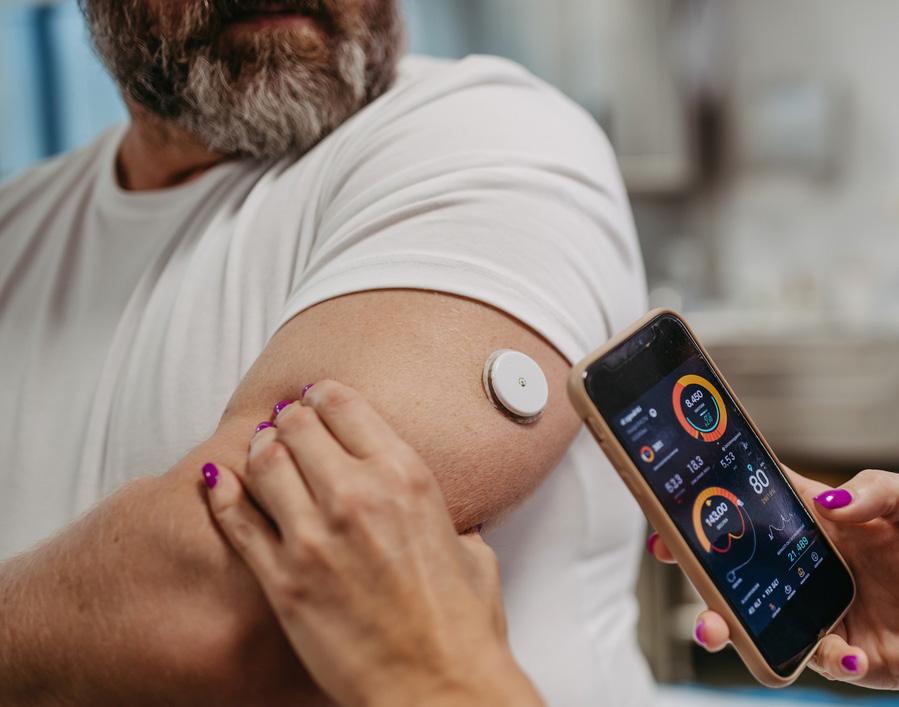Plus type 2 diabetes and a guide to smart snacking
In this issue of Your Health we welcome Anthony Newton, Counselling Psychologist, to discuss the link between masculinity, mental health and the workplace. We also examine how to recognise if you’re on the path to type 2 diabetes, highlighting strategies to lower your risk, plus a guide to snacking smart for Healthy Eating Week.
To understand masculinity in the workplace, we must look at masculinity in broader society.
Masculinity, Mental Health and the Workplace
BY ANTHONY NEWTON, COUNSELLING PSYCHOLOGIST AT PSYCH HEALTH
REAL MEN? LET’S TALK!
We’re living through a time when masculinity, and more broadly, gender identity are under intense scrutiny: challenged, celebrated, questioned and at times, fiercely debated. If you’re asking yourself, “What does it actually mean to be a man these days?”, you’re not alone! Is masculinity about strength and stoicism, or softness and self-awareness? Is it about providing and protecting, or expressing and evolving? Or is the problem that we feel so pulled to be one thing, therefore we can’t be the other?
Masculinity appears more divisive than ever as we see starkly different portrayals in the media, from Andrew Tate to Jamie Laing, to the troubling issues raised by Netflix’s recent hit Adolescence. While some voices dominate with bravado and certainty, the reality for most men tends to be more nuanced and quietly complex. This article aims to get beneath the surface, peeling back layers of gender, power and expectation. To understand masculinity in the workplace, we must look at masculinity in broader society. The workplace is a microcosm of the world around us; it both reflects and reinforces societal norms, laws, policies and expectations.
THE WORKPLACE: STRENGTHS, CHALLENGES AND COSTS
Masculinity in the workplace can be highly beneficial. Traits often associated with traditional masculinity – assertiveness, confidence and decisiveness – can positively influence leadership, innovation and competitive advantage. These qualities often play a critical role in driving results, fostering high performance and navigating complex challenges under pressure. Men can provide a balancing presence in diverse teams, enhancing team dynamics, promoting strategic decision-making and contributing to operational effectiveness. When harnessed in a healthy, inclusive way, these traits can create a workplace culture that thrives on ambition, focus and resilience.
Men can provide a balancing presence in diverse teams
However, some of these benefits can come with significant costs, particularly when gendered expectations impose unrelenting demands on men. Unspoken pressures to be endlessly productive, emotionally detached or fiercely self-reliant often push men into unsustainable patterns of behaviour. The societal emphasis on equating masculinity with invulnerability can make it difficult for men to express vulnerability, seek help or admit to struggles, whether they are mental, emotional or professional. This can lead to burnout, disengagement, and deteriorating mental health, creating a ripple effect that impacts not just the individual, but also their colleagues, teams and the wider organisation.
Furthermore, workplace cultures are rarely neutral; they are shaped by systemic forces such as policies, leadership behaviours and reward structures. These systems often reinforce certain masculine norms, such as competitiveness, stoicism and hyper-independence, which may not serve
everyone equally. For instance, a ‘winner takes all’ culture that prizes relentless ambition can alienate employees who prioritise collaboration, emotional intelligence or work-life balance. Such an environment may inadvertently discourage open communication, encourage toxic competition and leave individuals feeling isolated or undervalued.
As modern workplaces strive to become more inclusive and attuned to mental health, there is an opportunity to reimagine how masculinity is understood and expressed within professional settings. By challenging outdated stereotypes and fostering a culture that values emotional intelligence, empathy and vulnerability as much as assertiveness and confidence, organisations can unlock the full potential of their workforce. This not only benefits men by alleviating the pressures of traditional gender norms but also creates a more supportive and balanced environment for all employees, regardless of gender.
MENTAL HEALTH AND MASCULINITY: A QUIET CRISIS
In the UK, suicide remains the leading cause of death for men under 50, claiming thousands of lives annually. Suicide is both preventable and systemic – an outcome of complex social factors, including the stigma around mental health. Men are particularly vulnerable, with suicide rates nearly three times higher than those of women. This disparity highlights the urgent need to address the unique pressures men face, such as societal expectations around masculinity, which often discourage them from seeking help.
Men often struggle to recognise or admit when they’re overwhelmed or depressed, largely due to shame or societal expectations. Understanding mental health as a continuum, ranging from healthy (positive wellbeing, resilient) to unwell (low mood, disconnected), can be transformative. We all move along this spectrum throughout life, influenced by stress, circumstances and support systems. Problems arise when men are stuck in negative states but feel pressure to maintain a façade of strength, ultimately preventing them from accessing essential support.
From my experience as a therapist, many men arrive when their lives are already in collapse in terms of relationship breakdowns, job loss or crisis. Regardless, it takes a lot of strength for them to arrive. Therapy and emotional literacy don’t need to be last resorts. They can be proactive strategies to maintain mental health, improve relationships and build resilience. Men often benefit profoundly from speaking openly about their emotions with others who share similar experiences.
FATHERS, SONS AND THE MANOSPHERE
The absence of positive role models can lead boys and young men towards harmful online spaces like the manosphere, which often propagate extreme, misogynistic ideas. Netflix’s Adolescence starkly portrays this danger, showing how distorted notions of masculinity and sexism can escalate rapidly online, particularly among impressionable adolescents.
Fathers and caregivers have a critical role in teaching the next generation healthy values around masculinity. However, many fathers struggle to find time to bond with their sons and model emotional connection because they are busy providing for the family, often leaving this role to mothers. This lack of connection can leave boys seeking guidance from less healthy sources.
Fathers and caregivers have a critical role in teaching the next generation healthy values around masculinity.
It’s also important to consider that home is not always the safe haven it once was, especially if parents are unaware of what their children are watching in their rooms. The digital age has introduced new challenges in monitoring and guiding children’s online activities.
It’s worth reflecting on what we learned about masculinity from our own fathers or father figures. We can ask ourselves ‘were they happy, fulfilled and emotionally expressive?’, ‘what do we wish had been different?’ and ‘what values do we want to pass on?’.
f Model emotional intelligence, as leaders can show vulnerability and compassion.
f Prioritise self-care through exercise, hobbies and rest to strengthen your emotional resilience. Engage with content (books, podcasts) that challenge you and learn about other people’s experiences that are different to your own.
f Notice the quiet rules you’ve absorbed over time, like not crying in public, needing to ‘man up’ during stress or always being the provider. Ask yourself, do these beliefs help you thrive or do they box you in? Choosing how you want to live and work starts with making those rules visible and then deciding which ones deserve to stay.
f Seek support through therapy, coaching or conversations with trusted friends. Many men are on similar journeys. Therapy isn’t just sitting in a room and talking - it can take many forms. For some, it’s movement-based like exercise, for others, it’s about finding supportive groups or safe spaces to grow emotionally. It’s important to find your tribe and connect with communities that support the kind of growth you want to explore.
Think about your past, present and future. Reflect on the role masculinity has played, and how you’d like it to evolve. Consider what legacy you wish to leave for future generations and your inner child.
Masculinity can be a powerful, positive force when channelled intentionally. Men are multifaceted, and we don’t want to miss out on life by hiding who we are or being afraid to connect to ourselves or others. It’s time to build spaces in workplaces and beyond where men can show up fully, lead authentically and live richly and freely.
SUPPORT
If you or someone you know is struggling with suicidal thoughts, it’s important to seek help.
Here are some resources:
f Your GP or 111 can advise and offer support locally.
f Samaritans: Call 116 123 for free, confidential support 24/7.
f CALM (Campaign Against Living Miserably): Specifically for men, offering support via their helpline at 0800 58 58 58 or through webchat at thecalmzone.net.
How to Know if You’re on the Path to Type 2 Diabetes
DIABETES WEEK
Every year, Diabetes Week (June 16-22) shines a spotlight on one of the fastest-growing health challenges of our time: diabetes. In the UK alone, it’s estimated that almost 4.6 million people are living with a diabetes diagnosis, 90% of whom have type 2 diabetes, with an additional 6.3 million living with an increased risk of developing type 2 diabetes due to raised blood sugar levels.
The good news is that type 2 diabetes is largely an avoidable disease, so prevention is key, and early intervention where blood sugar levels are raised can make a significant difference. Understanding the risk factors and recognising the warning signs can help you take proactive steps to protect your health. Let’s explore how to know if you’re on the path to type 2 diabetes and what you can do to stop it in its tracks.
BLOOD SUGAR LEVELS
For most healthy individuals, normal blood sugar levels are:
f between 4.0 to 5.4 mmol/L when fasting f up to 7.8 mmol/L 2 hours after eating.
For people with diabetes, blood sugar level targets are as follows:
f before meals: 4 to 7 mmol/L for people with type 1 or type 2 diabetes
f after meals: under 9 mmol/L for people with type 1 diabetes and under 8.5mmol/L for people with type 2 diabetes.
WHAT IS TYPE 2 DIABETES?
Type 2 diabetes occurs when your body becomes resistant to insulin and sometimes in the later stages, fails to produce enough. Insulin is a hormone responsible for regulating blood sugar levels and when it doesn’t function properly, glucose builds up in the bloodstream. Over time, high blood sugar levels can lead to serious health complications, including heart and eye disease, kidney damage and nerve problems.
Unlike type 1 diabetes, which is an autoimmune condition, type 2 diabetes is heavily influenced by lifestyle factors such as diet, being physically inactive and weight.
WHAT YOU CAN DO TO LOWER YOUR RISK
Prevention is always better than cure and following the steps below can help to reduce your risk of developing diabetes.
f Adopt a balanced diet
Focus on whole, nutrient-dense foods like vegetables, fruits, whole grains, lean proteins and healthy fats. Limit processed foods, sugary drinks and refined carbohydrates.
f Stay active
Aim for at least 150 minutes of moderateintensity exercise per week, such as brisk walking, cycling or swimming. Even small changes, like taking the stairs or walking
If you have already been diagnosed as having prediabetes, it is still not too late. Further information and advice on reversing the prediabetic state can be found here: NHS Diabetes Prevention Programme. Remember to consult your own doctor before embarking on any significant lifestyle changes.
Once type 2 diabetes is established, reversal may not be possible, but similar steps to the above have helped thousands of people achieve and sustain remission of their diabetes which can have a profound impact on reducing the risk of complications of this disease.
Healthy Eating: A Guide to Snacking Smart
When it comes to healthy eating, snacks are often overlooked or misunderstood. While some see them as a temptation to be avoided, others rely on them to get through long days. The truth is snacks can be a powerful tool for maintaining energy, managing weight and improving overall health – when chosen wisely. In this article, we’ll explore the role of snacking in a healthy diet, how to use snacks as fuel for exercise and tips for making the best choices for your goals.
HOW OFTEN SHOULD YOU SNACK?
The frequency of snacking depends on your individual lifestyle and goals. Many people benefit from eating every 3-4 hours, which means 2-3 small snacks per day in addition to main meals. However, it’s important to listen to your body. Snack when you’re genuinely hungry, not just out of boredom or habit. If your goal is weight management, focus on portion-controlled snacks that are nutrient-dense. For those looking to gain weight, snacks can be an opportunity to include calorie-dense but healthy foods, such as nuts, seeds and avocados.
WHEN SNACKS CAN BE GOOD FOR YOU
Snacking isn’t inherently unhealthy. In fact, incorporating snacks into your daily routine can provide numerous benefits. Healthy snacks can:
f Stabilise blood sugar levels
Eating small, nutritious snacks between meals can prevent energy crashes and hunger spikes that lead to overeating.
f Boost focus and productivity
A well-timed snack can help you power through a busy workday or study session by fuelling your brain with essential nutrients.
f Support weight management
Contrary to popular belief, snacking doesn’t have to lead to weight gain. In fact, it can help you avoid overeating at main meals by keeping hunger in check.
f Aid recovery
Snacks packed with protein and carbs can help your body recover after exercise by repairing muscles and replenishing glycogen stores.
SNACKS AS FUEL – EXERCISE
Snacks can play a crucial role in your fitness routine, providing the energy you need to optimise performance and recover effectively.
f A pre-workout snack should focus on easily digestible carbohydrates to provide quick energy. Pairing this with a small amount of protein can also improve endurance. Examples include a banana with a dollop of peanut butter or a handful of oats with yoghurt.
f Post-workout snacks are all about recovery. Aim for a combination of protein and carbohydrates within 30 minutes to an hour after exercising. Protein helps repair and build muscle, while carbs replenish energy stores. A protein smoothie, hard-boiled eggs with whole-grain crackers or Greek yoghurt with berries are excellent options.
A good rule of thumb is to treat snacks as intentional mini-meals, designed to nourish your body and support your goals, rather than as an afterthought or emotional crutch.
WHEN SNACKS AREN’T SO GOOD FOR YOU
While snacking can be beneficial, it’s not always a healthy habit. Poor snack choices or excessive snacking can undermine your health and wellness goals. Here are some scenarios where snacks might do more harm than good:
f Mindless snacking
Eating out of boredom, stress or habit rather than genuine hunger can lead to consuming excess calories. If you find yourself reaching for snacks while watching TV or scrolling on your phone, it’s worth pausing to ask if you’re truly hungry.
f High-sugar, high-fat snacks
Many processed snacks, like crisps, chocolate bars and biscuits, are loaded with unhealthy fats, refined sugars and empty calories. These can cause spikes and crashes in energy levels and contribute to weight gain over time if eaten regularly.
f Over-snacking
Even healthy snacks can become a problem if portion sizes are too large or if you’re snacking too frequently. Constant
grazing throughout the day can lead to a calorie surplus, making it harder to maintain or lose weight.
f Skipping balanced meals
Snacks should complement your main meals, not replace them. If you rely too heavily on snacks instead of eating balanced meals, you may miss out on essential nutrients like fibre, healthy fats and vitamins found in whole foods.
f Emotional eating
Using snacks as comfort food to cope with emotions such as stress, anxiety or sadness can create an unhealthy relationship with food. While it’s okay to indulge occasionally, relying on snacks to soothe emotions can lead to overconsumption and guilt.
f Late-night snacking
Eating late at night, particularly caloriedense or sugary snacks, can disrupt digestion and sleep. If you’re snacking out of habit rather than hunger before bed, it may be worth reconsidering.
Health
TOP HEALTHY SNACKS
Looking for inspiration? Here are some of the best healthy snacks you can enjoy:
f Fruit and nut mix: A classic combination of natural sweetness and healthy fats, perfect for on-the-go energy.
f Rice cakes with peanut butter: Light and satisfying, with a good balance of carbs and protein.
f Houmous with veggie sticks: A great way to boost your fibre intake while enjoying a creamy, savoury dip.
f Hard-boiled eggs: Portable, protein-packed and versatile.
f Greek yoghurt with honey and berries: A naturally sweet treat that’s high in protein and
Mini snackable cheese: Choose options that are low in fat and sugar for a quick protein
Air-popped popcorn: A low-calorie snack that satisfies the craving for something crunchy. Edamame beans: High in protein and fibre, these are a fantastic savoury snack option. Apple slices with almond butter: A delicious combination of sweetness and healthy fats. Protein bars: Look for options that are low in sugar and high in protein.
Snacking doesn’t have to be the enemy of healthy eating. When chosen mindfully, snacks can provide vital nutrients, sustain energy and even support specific health goals like weight management.
RESOURCES
f How many people in the UK have diabetes?
f Type 2 diabetes | Diabetes UK
f What causes type 2 diabetes? | Diabetes UK
f Blood sugar levels: what is normal? | BHF
f The Mental Health Continuum | Delphis
f Healthier snacks - Food facts | NHS
f Healthier food swaps - Food facts | NHS
NEXT ISSUE:
f Mindful Walking
f Seasonal Flu
f Sun Awareness & Skin Health
At Health Partners we offer a full range of tailored health and wellbeing services.
Our thinking is innovative. We constantly develop new responses and tools designed to address the health and wellbeing challenges that face your business and people.
Our commitment is total. We invest in our services, creating new ones and keeping in step with every client. We constantly explore new ways of working and make no compromises in the quality of our services.
Simply put, we are here to help people be their best.















